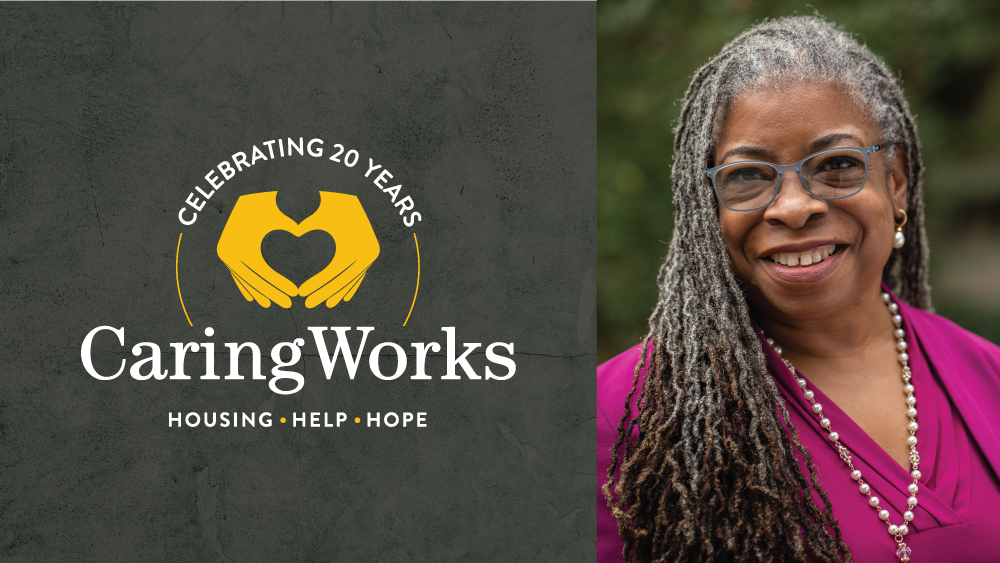2022 Letter: Looking Back, Looking Ahead

Housing. Help. Hope. A promise made 20 years ago. A promise that still resonates today. As we navigate a pandemic and turbulent social and political waters, CaringWorks remains resilient and laser focused on its mission.
When CaringWorks launched in 2002, I could not have foreseen where we would be today. My focus, then as it is now, was on providing the best possible service to the men and women who put their trust in us. Two decades and ten thousand clients later, we continue to grow in our effectiveness and our capacity to serve. In 2002, we operated four housing programs (including three afterschool centers) with four staff on a shoestring budget of $156K. Today, leveraging a team of 70+ employees and nearly 40 contractors on an operating budget approaching $13 million, we now have 15 housing programs, a residential addiction treatment program and a social enterprise venture that offers comprehensive outpatient behavioral health services.
This growth did not not occur in a vacuum. It was the result of our ability and willingness to respond to the community’s call. During the last two decades, and most significantly in the last seven years, there has been a sharp decline in the number of individuals experiencing homelessness in metropolitan Atlanta. Since 2015[1], sheltered homelessness has dropped nearly 40%. And the number of those experiencing street homelessness is down over 40% since 2013[2]. By increasing our inventory of permanent housing options, CaringWorks became a major contributor to our community’s progress. Consistent with our vision, we have become one of Georgia’s leaders in providing permanent supportive housing. Our portfolio of housing resources numbers more than 500 units across metropolitan Atlanta.
On any given day, we provide much-needed housing for hundreds of households. We also provide key services that support their desire to live a life of dignity and optimal well-being. The importance of that work is made more urgent as the enduring disparities in health outcomes and access to care are now better known. Across the country those disparities have largely affected Black and Hispanic households. In Atlanta, where income inequality leads the nation and the poor are disproportionately Black[3], these disparities grip us with a decided urgency.
- Blacks and Hispanics are up to two times more likely than Whites to have a chronic disease; and are more likely to die from it[4].
- The National Institute of Mental Health (NIMH) reports that while the prevalence of illness is not disproportionately represented among racial minorities and low income individuals, the lack of access to quality care is.
- The National HealthCare for the Homeless Council reports that homelessness leaves individuals more susceptible to infectious and chronic illness, mental health disorders, addiction and shorter life expectancies[5].
Indeed, we have witnessed the detrimental effects of homelessness and unattended chronic disease on our clients and recognize that we must act to improve both physical and mental well-being. Our ASPIRE[6] platform, which will be fully launched this year across all programs, will offer services that help clients optimize their physical and mental wellness.
- We will launch an opt-out program for behavioral health services which can now be provided to both uninsured (grant funded) or Medicaid-funded clients.
- A full-time registered nurse (RN) and full-time licensed practical nurse (LPN) will conduct physical assessments and provide education on health and nutrition. When appropriate, they will make referrals to medical providers.
- Care Coordinators will work with clients to increase their motivation to engage with their medical providers and follow prescribed health regimens.
- A community engagement specialist will collaborate with partners to link our clients to health promoting activities and services, i.e., health fairs, chronic disease self-management workshops, exercise/nutrition classes.
- The Commons at the Imperial and Hope House will host monthly behavioral health clinics to serve existing clients and attract new ones.
These amenities, along with other services and activities to improve economic resources, and promote community and civic engagement will enhance our ability to foster overall well-being among those we serve.
While I cannot predict what the next twenty years will bring. I do know that CaringWorks will continue as a leader in ending homelessness in Georgia. We will operate both as a housing provider and an advocate for more quality affordable housing. We will continue to put our clients first by providing relevant care that promotes overall wellness and better connections to family and community. That translates into ongoing client engagement to ensure we are meeting their needs, continuous research and training to learn the most effective, evidenced-based practices, and maintaining a work environment that attracts and retains the best staff. And we will commit to ongoing advocacy for better policies and more resources to increase support and reduce the stigma that is too often attached to homelessness, addiction and mental illness.
Thanks to all of you for your work and support during our first twenty years. I can’t wait to see what the future will bring. One thing is clear: we do know that caring really works.
[1] Year of current counting method as per https://partnersforhome.org/data/
[2] https://partnersforhome.org/data/
[3] https://www.bizjournals.com/atlanta/news/2020/06/26/a-walk-together-economic-disparities-black-mecca.html#:~:text=The%20city%20of%20Atlanta%20leads,3%2Dto%2D1%20ratio.
[4] https://www.ncbi.nlm.nih.gov/pmc/articles/PMC3794652/
[5] https://nhchc.org/wp-content/uploads/2019/08/homelessness-and-health.pdf
[6] ASPIRE = Advancing Self-Reliance, Pride, Independence, Resilience and Empowerment
